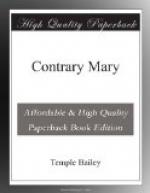“Of course you don’t, duckie. To me, the whole thing was an adventure along the road—to you, it would have been a heart-break.”
Her words came clearly to Roger. That, then, was what love meant to some women—an adventure along the road. One man served for pleasuring, until at some curve in the highway she met another.
Lilah was challenging her audience. “And now you see why I was dreadful Lilah. I fit the name they had for me, don’t I?”
Her question was put at Porter, and he answered it. “It is women who set the pace for us,” he said; “if they adventure, we venture. If they lead, we follow.”
General Dick broke in. With his halo of white hair and his pink face, he looked like an indignant cherub. “The way you young people treat serious subjects is appalling;” then he felt his little daughter’s hand upon his arm.
“Lilah is always saying things that she doesn’t mean, Dad. Please don’t take her seriously.”
“Nobody takes me seriously,” said Lilah, “and that’s why nobody knows me as I really am.”
“I know you,” said her father, “and you’re like a little mare that I used to drive out on the ranch. As long as I’d let her have her head, she was lovely. But let me try to curb her, and she’d kick over the traces.”
They all laughed at that; then their tea came, and a great plate of toast, and the conversation grew intermittent and less interesting.
Yet the man at the other table had his attention again arrested when Lilah said to Porter, as she drew on her gloves:
“We are invited to Mary Ballard’s for Thanksgiving, and you’re to be there.”
“Yes—mother and father are going South, so I can escape the family feast.”
“Mary Ballard is—charming——” It was said tentatively, with an upward sweep of her lashes.
But Porter did not answer; and as he stood behind her chair, there was a deeper flush on his florid cheeks. Mary’s name he held in his heart. It was rarely on his lips.
Mary had not wanted Delilah and her father for Thanksgiving. “But we can’t have Leila and the General without them,” she said to Barry, after a conversation with Leila over the telephone, “and it wouldn’t seem like Thanksgiving without the Dicks.”
“Delilah,” said Barry, comfortably, “is good fun. I’m glad she is coming.”
“She may be good fun,” said Mary, slowly, “but she isn’t—our kind.”
“Leila said that to me,” Barry told her. “I don’t quite see what you girls mean.”
“Well, you wouldn’t,” Mary agreed; “men don’t see. But I should think when you look at Leila you’d know the difference. Leila is like a little wild rose, and Delilah Jeliffe is a—tulip.”
“I like tulips,” murmured Barry, audaciously.
Mary laughed. What was the use? Barry was Barry. And Delilah Jeliffe would flit in and out of his life as other girls had flitted; but always there would be for him—Leila.




